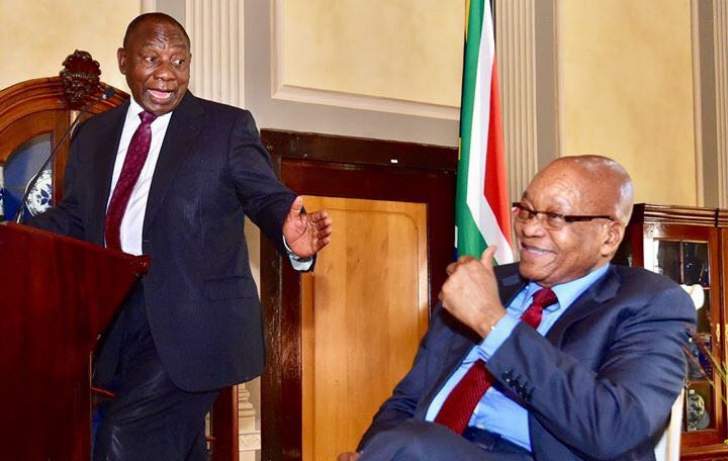Ramaphosa places Zuma on the firing line at the Zondo Commission

President Ramaphosa and Zuma
South African President Matamela Cyril Ramaphosa has distanced himself from the former President Jacob Zuma administration’s dealings with the infamous Gupta family that is accused of capturing the state.
Speaking at the State Capture Commission on Wednesday Ramaphosa said after realizing that the state was captured he wanted to resign but chose to remain in the Executive and fight the system from within.
“The final option, which was what I chose, was to remain in my position as Deputy President, to work with others in the Executive to resist abuses and bring about change where we could and to sustain the work of social and economic transformation,” Ramaphosa said.
Read his statement below:
Many of the incidents of corruption that would in time be described as ‘state capture’ became known to me as they did to the general public through the work of journalists, civil society organisations, and institutions such as the Public Protector and Auditor General.
Reports of court cases and disciplinary proceedings, together with the commendable work of investigative journalists and whistle-blowers, gave insight into corruption in both government and the private sector.
As it became increasingly clearer – through the so-called Gupta Leaks and other revelations – that a network of individuals was seemingly colluding with senior government officials to occupy key positions and ‘capture’ key institutions, the question that arose was how to respond.
The first option available to me was to resign from the Executive. While I would have earned praise from many quarters, this action would have significantly impaired my ability to contribute to bring about an end to state capture.
This was a question that not only I had to grapple with, but also other members of the Executive who were deeply concerned about these developments. I had five options: resign, speak out, acquiesce and abet, remain and keep silent, or remain and resist.
Had I and like-minded individuals resigned from the Executive, we would have had no ability to resist the excesses that were taking place – and there was a clear danger that without resistance, there would have been even fewer impediments to the expansion of state capture.
It was also important to pursue and sustain the many government programmes that were vital to the transformation of our society and the improvement of people’s lives.
The second option was to be more confrontational; to speak out publicly against certain decisions or actions of the government. While there were instances where I did make public statements, there was a limit to how confrontational I could be in my position.
A more confrontational approach would most likely have led to my removal from office, with the same consequences as a resignation, in that my ability to effect change would have been greatly constrained, if not brought to an end.
The third option was to acquiesce and thereby abet the committing of misdeeds. This I would not and could not, do. It would have been a violation of my principles and a profound betrayal of my responsibility to the government, my organisation and the people of South Africa.
The fourth option available to me was to remain in my position as Deputy President and keep silent. This may have been the easier path, but it was, in my view, not much different to acquiescing.
The final option, which was what I chose, was to remain in my position as Deputy President, to work with others in the Executive to resist abuses and bring about change where we could and to sustain the work of social and economic transformation.
This meant ‘staying in the arena’, with the challenges, limitations and frustrations inherent in doing so, but it was the course of action that had the greatest likelihood of bringing state capture to an end, restoring the institutions of State and defending our democracy.
My ability and the ability of others to resist and ultimately to bring about changes that would end state capture relied to a large measure on the political balance of forces within the Executive, within the governing party and within society more broadly.
–-Bulawayo24




